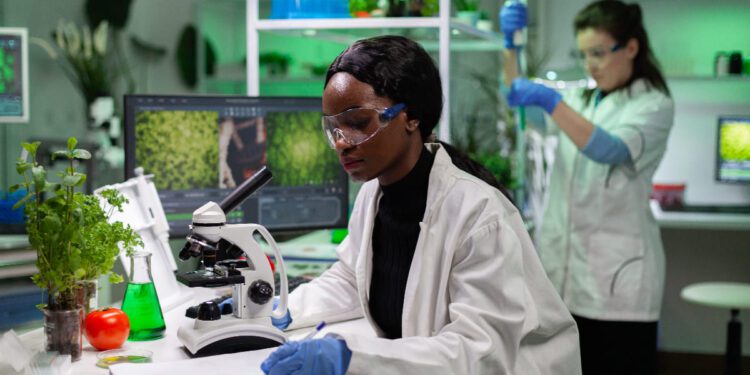Contents
Introduction
Biotechnology is a multidisciplinary field that harnesses the power of biology, genetics, and technology to create innovative solutions for various sectors. It encompasses a wide range of applications, from healthcare and agriculture to environmental conservation and industrial processes. In this article, we will delve into the fascinating world of biotech, exploring its scope, main types, key examples, and the significant impact it has on our lives.
What is Biotechnology?
Biotechnology can be defined as the application of biological principles and techniques to develop products, processes, or technologies that improve our lives. It involves using living organisms or their components to create beneficial products and services. Biotech has evolved over the years, and its applications have grown to touch various aspects of human existence.
Scope of a BS in Biotechnology
A Bachelor of Science (BS) in Biotechnology opens up a vast array of opportunities for aspiring biotechnologists. Graduates with a BS in Biotech can pursue careers in research and development, quality control, pharmaceuticals, agriculture, food production, and more. The program equips students with the necessary knowledge and skills to work at the forefront of cutting-edge research and development in the biotech industry.
Types of Biotechnology
a. Medical Biotechnology: This type focuses on the development of new treatments, therapies, and medical devices to improve human health. It includes areas like gene therapy, personalized medicine, and the production of vaccines and antibiotics.
b. Agricultural Biotechnology: Agricultural biotech aims to enhance crop productivity, resistance to pests and diseases, and overall agricultural sustainability. Genetically modified organisms (GMOs) are a prominent example of agricultural biotech.
c. Industrial Biotechnology: Industrial biotechnology harnesses biological processes to create bio-based products and reduce the environmental impact of industrial processes. It involves the production of biofuels, biodegradable plastics, and enzymes for various industrial applications.
d. Environmental Biotechnology: This type seeks to address environmental challenges by using biological agents to remediate polluted environments, reduce waste, and conserve natural resources.
Recommended: HOW HAS THE DEVELOPMENT OF TECHNOLOGY POSITIVELY AFFECTED OUR WELLNESS?
Examples of Biotechnology Applications
a. Insulin Production: One of the earliest and most well-known biotechnological breakthroughs is the production of insulin using recombinant DNA technology. This has revolutionized diabetes treatment and significantly improved the quality of life for millions of people.
b. CRISPR Gene Editing: CRISPR-Cas9 is a revolutionary gene-editing tool that allows scientists to modify DNA with remarkable precision. It holds the potential to cure genetic diseases and improve agricultural crops.
c. Bioremediation: Environmental biotech plays a crucial role in bioremediation, where microorganisms are used to clean up oil spills, contaminated soil, and water bodies.
d. Plant Biotechnology: Agricultural biotech has led to the development of genetically modified crops with improved resistance to pests and diseases, increased nutritional content, and better yields.
e. Biopharmaceuticals: Biotech has enabled the production of biopharmaceutical drugs using living cells. These drugs offer targeted treatments for various diseases, such as cancer and autoimmune disorders.
The Importance of Biotechnology
Biotechnology’s significance lies in its potential to address global challenges and improve the quality of life for people worldwide. Some key aspects of its importance include:
a. Advancing Healthcare: It has revolutionized healthcare with personalized medicine, advanced therapies, and improved diagnostic techniques.
b. Enhancing Agriculture: Through genetic engineering and improved crop breeding, biotech contributes to sustainable agriculture and food security.
c. Environmental Conservation: Biotech aids in developing eco-friendly solutions and reducing environmental impact.
d. Industrial Advancements: It drives innovation in various industries, leading to greener and more sustainable processes.
e. Economic Growth: Biotech fosters economic growth by creating new industries and generating job opportunities.
Conclusion
The field of biotechnology is constantly evolving, and its potential seems limitless. From gene editing to developing sustainable bio-based products, biotechnology continues to drive scientific advancements and revolutionize various industries. As we venture further into this realm, ethical considerations become paramount to ensure responsible and safe applications.
In conclusion, biotechnology holds the key to addressing many of the pressing challenges we face today. Whether it’s finding cures for diseases, developing climate-friendly solutions, or ensuring food security, biotech remains a critical tool in our pursuit of a better world. As researchers, scientists, and policymakers collaborate to harness its potential, we can look forward to a future where biotech plays an even more significant role in shaping a healthier, greener, and more sustainable planet.
So, as we embark on this biotechnological journey, let us embrace innovation, collaboration, and responsible practices to unlock the true potential of biotech. By doing so, we can create a world where technology and biology intertwine harmoniously, paving the way for a brighter and more promising future.













